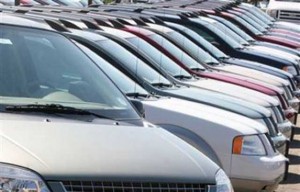
Economists expect buyers will have an easier time getting credit in 2014, and keep sales clicking along.
With 2013 fast coming to a close, new car sales have wildly exceeded even the most optimistic forecasts made at the beginning of the year – and increasingly easy and affordable credit is one of the factors planners and analysts cite for the industry’s resurgence.
However, the burning question heading into next year is: will that trend continue? While some observers worry the market might be ready to cool down, favorable credit trends could keep it going, according to a survey by WalletHub.com
“Interest rates will remain low for the foreseeable future due to the combination of record-low credit losses – with the exception of a single quarter in 2006, charge-offs are at the lowest level since 1995 – and the Federal Reserve’s commitment to retain current policies until more demonstrable economic improvement takes place,” said Odysseas Papadimitriou, WalletHub’s chief executive officer.
While the Federal Reserve Board’s clear directives will keep market volatility in check to a certain extent, Papadimitriou added, some experts believe that deflation could become a more serious issue.
In addition, fuel prices, an unpredictable feature of U.S. economic life for four decades, should remain relatively stable during the coming year, he said.
“The U.S. Energy Information Administration projects that retail gasoline will average $3.37 per gallon in 2014, down from roughly $3.50 in 2013 and $3.63 in 2012,” Papadimitriou said. “Much of this positive trend can be attributed to the domestic energy revolution witnessed in recent years, and provided there are no major surprises from the Middle East in the coming months, we should expect to see low prices at the pump throughout 2014.
“This should help household balance sheets gain a bit of a breathing room and will hopefully make people less reliant on debt to pay for everyday expenses.”
WalletHub interviewed several economists in preparing its 2014 predictions, and the general consensus is that the economy will continue its slow growth in 2014, turning the year into the transitional period that 2013 should have been and bringing the economy back on track heading into 2015.
“The cautious optimism with which we’ve viewed the economic recovery of late has been clearly reflected in the stock market, which soared to record highs in 2013 yet was marked by tremendous volatility,” he said.
(Bulging auto inventories may start price war. For more, Click Here.)
WalletHub noted some experts are predicting continued growth, while others feel that a significant correction is in order, but the best bet is that the stock market will continue to rise along with the economy in 2014.
“Not only will companies be healthier in the New Year, but with disposable income on the rise and low interest rates fostering a dearth of attractive bond options, we should see more individual investors re-enter the market as well,” Papadimitriou added.
Papadimitriou noted after peaking at 10.97% during the second quarter of 2010, the credit card charge-off rate has since fallen considerably. In fact, it declined more than 15% during 2013 alone, beginning at 3.78% and falling to 3.19% by year’s end.
(Click Here to how the fuel economy is improving despite drop in gas prices.)
The trend indicates that credit card users have drastically improved their ability to stay current on monthly payments as the economy has improved, thereby alleviating the uncollectible debt burden on banks. We expect that charge-off rates will continue to fall in 2014 before ultimately reaching a bottom and that overall credit score improvement will follow, he added.
